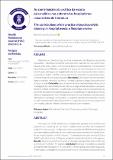Use este identificador para citar ou linkar para este item:
https://repositorio.fepecs.edu.br:8443/handle/123456789/1066| Tipo: | Artigo de Periódico |
| Título: | As contribuições da prática da escutapsicanalítica nas enfermarias hospitalares: uma revisão de literatura |
| Título(s) alternativo(s): | The contributions of the practice of psychoanalytic listening in hospital wards: a literature review |
| Autor(es): | Santos, Bruno Gomes dos |
| Resumo: | Objetivou-se, com este artigo, explorar as possíveis contribuições que a escuta psicanalítica realizada nas enfermarias hospitalares pode oferecer ao sujeito hospitalizado. Para tanto, utilizou-se a revisão de literatura orientada nas recomendações metodológicas do PRISMA, cumprindo as 4 etapas na sistematização de busca: (a) identificação; (b) triagem; (c) elegibilidade e (d) inclusão. As bases de dados contempladas foram SciELO e PePSIC, com recorte temporal de 10 anos, produções disponíveis na íntegra e de língua portuguesa. Resultados: 28 artigos foram encontrados. Após uma leitura minuciosa dos textos na íntegra, apenas 6 artigos foram selecionados para análise. Conclusão: a escuta revela-se como uma estratégia valiosa para a investigação da subjetividade; favorece dar voz à singularidade do sujeito, consequentemente, implica a promoção da autonomia ao promover não só a humanização do atendimento, mas também potencialização da (re)construção de significados. Vínculo, adesão e adaptação foram identificados como possíveis contribuições, somadas à possibilidade de o psicólogo desempenhar um papel de educador, fortalecendo o sujeito no enfrentamento da hospitalização. Porém, é imperativo estar atento à exigência de uma readequação do método à realidade da instituição hospitalar. |
| Abstract: | The objective of this article was to explore the possible contributions that psychoanalytic listening carried out in hospital wards can offer the hospitalized subject. For that, we used the literature review guided by the PRISMA methodological recommendations, fulfilling the 4 steps in the search systematization: (a) identification; (b) sorting; (c) eligibility and (d) inclusion. The databases included were SciELO and PePSIC, with a time frame of 10 years, productions available in full and in Portuguese. Results: 28 articles were found. After a thorough reading of the texts in full, only 6 articles were selected for analysis. Conclusion: listening is revealed as a valuable strategy for the investigation of subjectivity; it favors giving voice to the singularity of the subject, consequently, it implies the promotion of autonomy by promoting not only the humanization of care, but also the potentialization of the (re)construction of meanings. Bonding, adherence and adaptation were identified as possible contributions, in addition to the possibility of the psychologist playing an educator role, strengthening the subject in coping with hospitalization. However, it is imperative to be aware of the requirement of a readjustment of the method to the reality of the hospital institution. |
| Palavras-chave: | Psicanálise Enfermaria Escuta psicanalítica Psicologia hospitalar |
| CNPq: | CNPQ::CIENCIAS HUMANAS::PSICOLOGIA |
| Idioma: | por |
| País: | Brasil |
| Editor: | Escola Superior de Ciências da Saúde |
| Sigla da Instituição: | ESCS |
| Citação: | SANTOS, B. G. As contribuições da prática da escuta psicanalítica nas enfermarias hospitalares: uma revisão de literatura. Health Residencies Journal - HRJ, [S. l.], v. 4, n. 18, 2023. DOI: 10.51723/hrj.v3i18.605. Disponível em: https://escsresidencias.emnuvens.com.br/hrj/article/view/605. Acesso em: 8 maio. 2024. |
| Tipo de Acesso: | Acesso Aberto |
| URI: | https://repositorio.fepecs.edu.br:8443/handle/123456789/1066 |
| Data do documento: | 8-Nov-2022 |
| Aparece nas coleções: | Saúde do Adulto e do Idoso |
Arquivos associados a este item:
| Arquivo | Descrição | Tamanho | Formato | |
|---|---|---|---|---|
| HRJ_v4n18_09a_Escuta-psicanalitica+(1).pdf | ARTIGO_HRJ_RES_ascontribuicoesdapraticadaescutapsicanalitica | 330,33 kB | Adobe PDF |  Visualizar/Abrir |
Os itens no repositório estão protegidos por copyright, com todos os direitos reservados, salvo quando é indicado o contrário.

